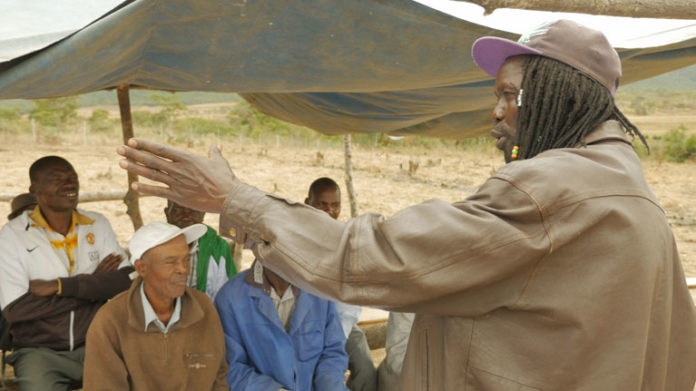Un projet de l’Organisation Internationale du Travail (OIT) sur l’égalité hommes-femmes au Zimbabwe a permis aux chefs traditionnels de comprendre les avantages qu’il y a à associer les femmes aux activités économiques et sociales.
Les chefs traditionnels jouent un rôle important dans les communautés rurales du Zimbabwe. Outre leurs fonctions coutumières, ils sont habilités à allouer les terres, à régler les différends et à veiller à ce que les règles et valeurs culturelles, héritées de leurs ancêtres, soient préservées.
Compte tenu de leur influence au sein de leurs communautés, des sessions de formation ont été organisées spécialement à leur intention, dans le cadre d’un projet de l’OIT sur l’égalité entre hommes et femmes.
Or le problème est que la plupart des chefs traditionnels du Zimbabwe ont une vision de la société qui repose sur la domination masculine.
Selon Hopolang Phororo, Directrice du bureau de pays de l’OIT pour le Zimbabwe et la Namibie, «tout changement de comportement à l’égard des femmes exige d’associer les hommes à nos programmes pour l’égalité entre hommes et femmes».
Madamombe, leader traditionnel, est le chef du village de Ward 1, situé dans le district de Murewa, à environ 75 kilomètres de Harare, la capitale du pays. Selon lui, les femmes de sa communauté ont toujours été traitées à un niveau inférieur à celui des hommes, auxquels elles se doivent d’être soumises. Dans le même ordre d’idée, il a toujours pensé, quoi qu’il en dise, que les femmes doivent obéir sans poser de questions et qu’elles n’ont même pas le droit de prendre part aux discussions.
Cependant, les choses ont commencé à changer lorsqu’il a participé aux sessions de formation organisées par l’OIT dans le cadre du Programme conjoint des Nations Unies pour l’égalité entre hommes et femmes .
Cette formation portait, entre autres, sur les thèmes suivants: estime de soi, renforcement de la confiance et exercice de l’autorité; moyens de subsistance et sécurité alimentaire; création d’entreprise; égalité entre hommes et femmes; droits des femmes; conditions de travail des femmes; santé sexuelle et reproductive, y compris le mariage des enfants; violence sexiste et violence domestique; et questions liées au VIH et au sida.
Bien que le projet vise plus généralement à favoriser l’autonomisation économique des femmes, il a fallu, dans un premier temps, organiser des formations sur le changement de comportement à l’égard des rôles respectifs des hommes et des femmes.
Au début, Madamombe a eu du mal à accepter l’idée même de prendre part à la formation. Sa première réaction a été de dire que c’était une perte de temps et d’argent, fermement convaincu qu’il était que les femmes ne sont pas capables d’exercer quelque activité économique que ce soit.
« J’ai trouvé la formation très difficile au début car j’avais l’impression qu’on cherchait à me rabaisser au niveau des femmes. » Madamombe, Chef traditionnel
Toutefois, à mesure que la formation avançait, il s’est rendu compte que l’objectif visé était complètement différent. « J’ai commencé à me rendre compte que le but de la formation était de m’aider à comprendre qu’une femme est capable de faire tout ce que je fais moi-même.» C’est à partir de ce moment-là que Madamombe a commencé à réfléchir à la contribution de la femme au ménage.
« Je me suis rendu compte que, la plupart du temps, les hommes passaient leur temps à ne rien faire ou se retrouvaient au village (au magasin local) pour s’amuser avec leurs amis, tandis que les femmes travaillaient à la maison, allaient chercher du bois ou essayaient de trouver des travaux à effectuer dans les fermes en échange de quoi nourrir leur famille », ajoute-t-il.
Désormais les chefs témoignent que la participation des femmes a radicalement transformé la communauté. Les femmes sélectionnées pour ce programme comptaient parmi les plus pauvres de la communauté mais, aujourd’hui, elles ont acheté du bétail, construit des maisons et des toilettes, et elles ont de quoi payer les frais de scolarité de leurs enfants.
Dans le district de Murewa, on a même constaté une réduction du nombre d’actes de violence perpétrés contre des femmes, conséquence à la fois de la formation et du fait que les femmes génèrent désormais des revenus tirés des projets de culture de potagers.
Madamombe est devenu un «exemple de comportement masculin» dans sa communauté, en tant que défenseur de la cause des femmes auprès des autres chefs traditionnels et des membres de sa communauté. Il a même introduit un système de quotas au sein des comités qu’il préside: désormais, les femmes représentent 50% des membres de ces comités, ce qui permet de prendre des décisions tenant compte des besoins aussi bien des femmes que des hommes.


